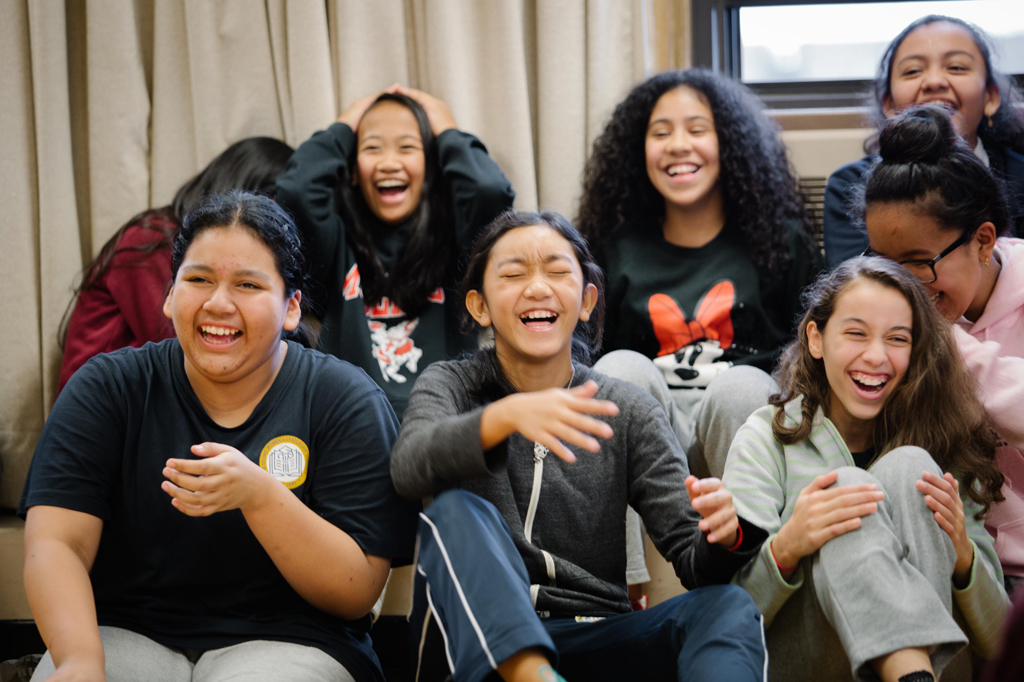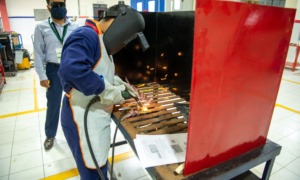Actress Riti Sachdeva stands before a group of 11- and 12-year-old girls and whips out a direction.
“Give me the name of an invention!” she says.
“Wackadoodle!” yells one of the girls.
Sachdeva seats herself in a chair on the imaginary set of a TV show. “I’m a talk show host,” she tells them. The girls will be guests on her show.
She turns to a group of three, her first guests.
“So tell me about the Wackadoodle,” she says.
They think fast.
“It’s a time machine that takes you back to the past,” one blurts out.
There’s a pause.
The second girl gets inventive. “If you eat the purple capsule, it will take you into the future,” she says.
Everyone turns to the third girl.
“And if you eat the pink capsule, it takes you to the past,” she explains.
With each new description the Wackadoodle emerges more clearly, and its story gets bigger and bigger. Along the way, there are plenty of laughs and giggles.
The students are in an after-school program at Irwin Altman Middle School 172 in Queens, New York, run by the youth development organization South Asian Youth Action.
They’re doing improv, unscripted acting in which players create a story, characters, dialogue and action as they go along. The improv program, known as Funny Girls, was created for middle school girls by the Harnisch Foundation and is being introduced in four youth development organizations in New York City and one in Richmond, Virginia.
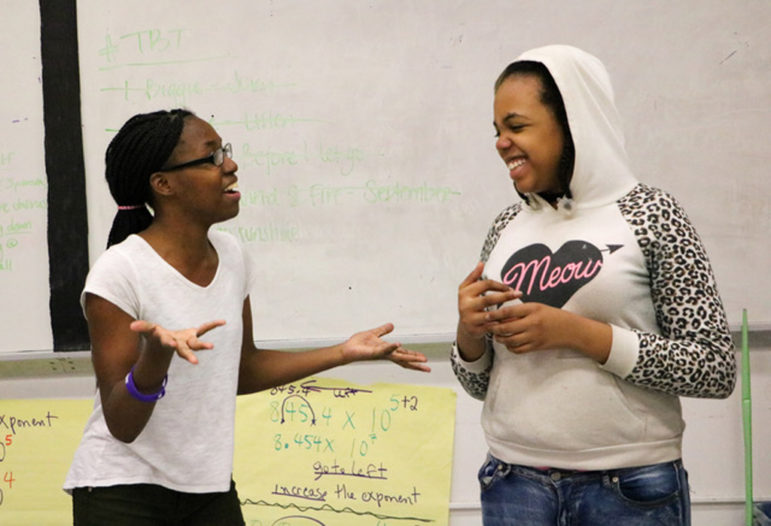
Girls in the Global Kids after-school program experiment with improv at the New Directions school in the Bronx.
Photo: Globall Kids
Funny Girls is play with a purpose.
“We aren’t teaching them to be funny,” said Jennifer Raymond, executive director of the Harnisch Foundation. Although the girls create comic scenes and laugh a lot, the program’s intent is to teach self-awareness and resilience. It’s designed to foster empathy, agility and the ability to collaborate with others.
These are leadership skills that girls need, according to the foundation, which has long supported women’s leadership development.
Why improv?
“One of the important things about improv is that it teaches you to listen,” said Sachdeva, the Funny Girls teaching artist at South Asian Youth Action.
In the Wackadoodle scene, each girl had to listen carefully and collaborate to embroider the next part of the story.
Leadership is about having the social and emotional skills to succeed, Sachdeva said. It’s about understanding how to communicate, not only by developing public speaking skills, but also understanding the difference between assertive, aggressive and passive communication, she said.
“It’s about confidence-building,” she said.
Research has shown that girls lose confidence as they move into adolescence. Improv is a way to bring it back, according to the Harnisch Foundation.
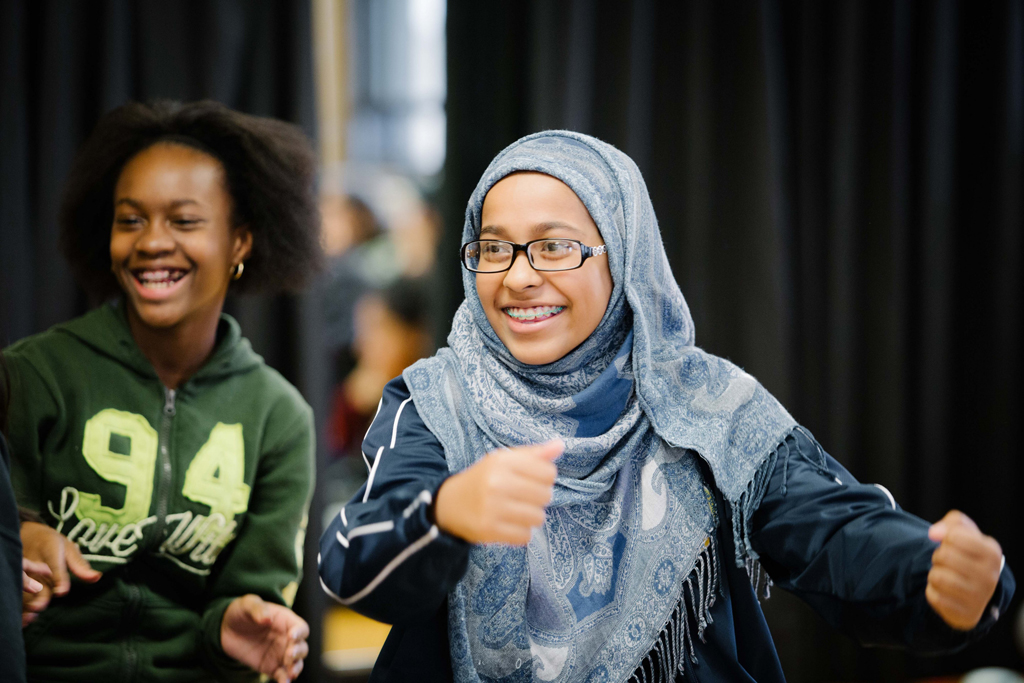
The Funny Girls curriculum has 11 sessions. The first sessions define what a leader is and introduce girls to concepts and skills, said Carla Blumenthal, Harnisch Foundation program manager for Funny Girls. A separate session is also devoted to each of the five skills:
- self-awareness
- empathy
- collaboration
- resiliency
- agility.
Nurturing resilience
In one improv game, Dolphin Trainer, a girl takes the role of a dolphin and another pretends to be its trainer. The trainer is instructed to imagine what action she wants the dolphin to take. The dolphin is sent out of the room and the trainer tells the audience the action she’s envisioned.
The dolphin returns and must try out actions and movements — from jumping to swimming to squawking — to discover what the trainer wants. The audience can signal the dolphin that she’s coming close by saying “ding, ding.”
“They laugh all the way to figuring out a solution,” Blumenthal said.
When the girls discuss the game afterwards, the dolphin describes trying one thing after another.
“The dolphin often says, ‘That was really tough,’” she said. “‘I thought the answer was this thing and it wasn’t.’”
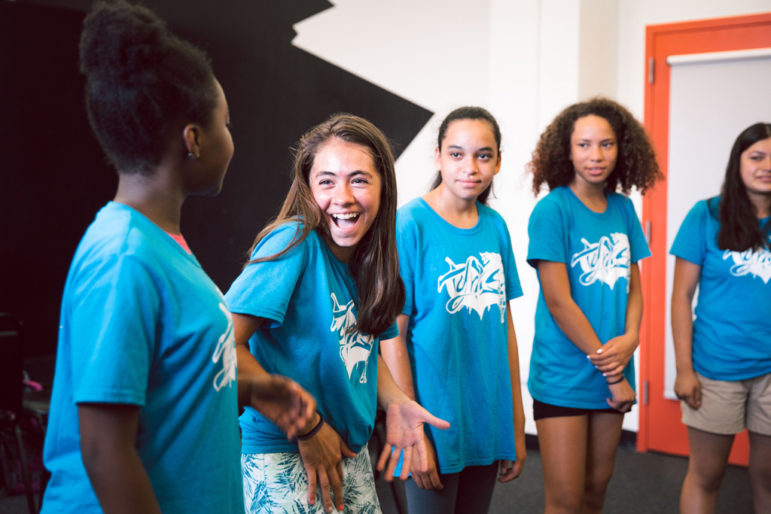
Young Women’s Leadership School students practice at their Explorers Summer Camp.
Brittany Buongiorno
To figure out the right action, the girls have to “think much bigger,” Blumenthal said.
Resilience involves trying different strategies to achieve goals, she said, and agility is about listening, thinking and being able to respond quickly.
Being in tune with others
At the outset, the girls learn the rules of improv, which includes “yes, and” — which means that when one person in a scene makes a statement, the other must accept it and build on it.
Sachdeva teaches this concept through a game in which girls pair up and one makes a suggestion.
“Let’s go eat a chocolate sundae,” the first one might say. “Yes, and let’s feed the leftovers to the squirrels,” the second could reply.
“Yes, and let’s …” comes the next response.
Instead of countering the suggestion, each girl builds on the other’s idea “so that it becomes a bigger idea,” Sachdeva said.
The girls also practice agreeing and disagreeing, she said.
Another premise in improv is to make your partner look good, said Lesly Fredman, an improv teacher in Atlanta.
“It’s about being in tune with your partner,” she said. “There is that sense of being aware of life outside your own body and your emotional state. You try on characters in improv. You’re working with emotions and you step outside of yourself to create another’s life.”
In doing this, girls gain self-awareness, said Raymond of the Harnisch Foundation,
While 12- and 13-year-olds can describe emotions as happy, sad and mad, they are not as familiar with a wide range of terms for emotions, she said.
When they are shown a broad spectrum of emotions — through creating characters and then discussing them — they develop a much more nuanced sense of their own and others’ feelings, she said.
In the game Emotional Hitchhiker, three girls pretend to be riding in a car. A fourth is a hitchhiker, who must enter the car with a particular emotion. The other passengers must take on that emotion and figure out different ways to express it in the scene. Then one passenger must figure out a reason to leave and another hitchhiker with another emotion enters the car. Everyone takes on the new emotion.
Improv is also about creating a safe space where players feel free to experiment.
“If one thing doesn’t work, try another,” said improv teacher Fredman. “We don’t talk about mistakes as leading to failure. It’s not about doing it right. It’s being willing to take risks.”
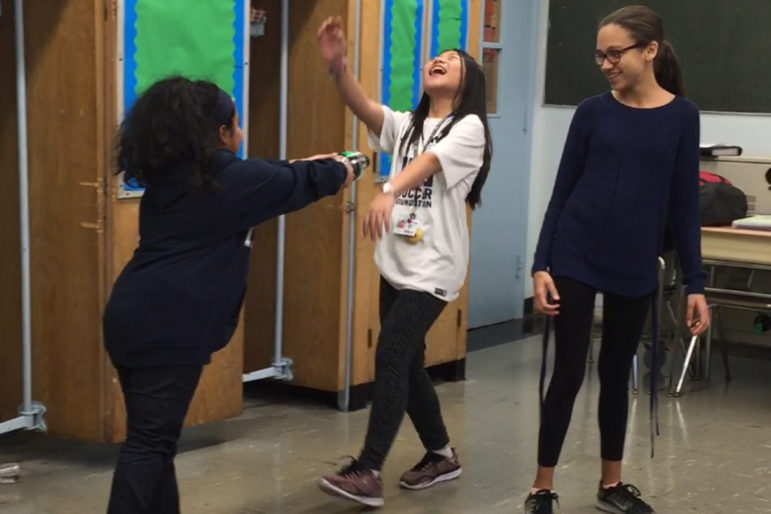
Funny Girls do their stuff at Irwin Altman Middle School 172 in Queens, New York, at the program run by South Asian Youth Action.
Neyla Sachi
“Our girls are sometimes a little shy,” said Lisalee Ibanez, director of middle school programs for Global Kids. “Funny Girls is an opportunity and an outlet to express themselves in ways they didn’t think they could. Some of the shy girls really open up and want to participate and lead activities.”
When Funny Girl concepts are introduced, the girls are curious and want to know more, she said. They learn to take the lead in improv and to voice what they feel in ways that are empathetic and respectful of others.
One sixth grader described working on a science presentation with a group of students who frustrated her, Raymond said.
“Before this [Funny Girls] class I would just have yelled at them,” said the girl, according to Raymond. Instead the girl went to the group and had a discussion that was constructive.
“In order to lead others, you need to lead yourself first. Part of it is managing your emotions,” Raymond said.
5 locations
In September, Funny Girls debuted in
- Dream Yard, an organization for kids in the Bronx focused on arts, digital tools and social justice;
- Casita Maria Center for Arts & Education serving Hispanic kids in the south Bronx;
- Global Kids, which engages underserved kids in New York City and Washington, D.C.;
- Girls for a Change, which supports girls of color in realizing their potential in Richmond, Virginia;
- South Asian Youth Action, which offers leadership development, academic support, sports, arts and STEM instruction in Queens and Brooklyn.
All are organizations dedicated to social justice and to chipping away at the roots of inequality, Raymond said.
Funny Girls is offered by Global Kids in two New York schools, Washington Heights Expeditionary Learning School in Manhattan and New Directions Secondary School in the Bronx. The organization serves about 3,000 kids in after-school programs in New York City and Washington, D.C.
Embody the concepts
Often when ideas are introduced, Sachdeva said, girls may not understand them at the concept level. But as they express the ideas through improv, they gain understanding and learn how to put them into practice.
“Young women’s leadership [development] is a lot easier to do with high school students,” she said, because older girls are already skilled at relating concepts to practice.
That’s why the Funny Girls curriculum is a useful tool for middle school girls, she said. It allows them to “embody the concepts through the games,” she said.
When the program was tested with middle school girls, some of whom were old enough to have experience with leadership positions, they related the Dolphin Trainer exercise to the challenge of figuring out solutions with a group, Raymond said.
Realizing that some problems require stepping back and thinking big was “a tremendous insight,” Raymond said.
Striking the right balance with other people is a leadership skill, Fredman said.
“Leaders say ‘yes, and …’ — not just do it my way,” she said.
Improv involves building trust in your own voice and in relationship to others, she said.
“I think leadership is about trusting your own voice and feeling free to use it,” she said.
The Harnisch Foundation was an early funder of the Center for Sustainable Journalism.
This story has been updated.


